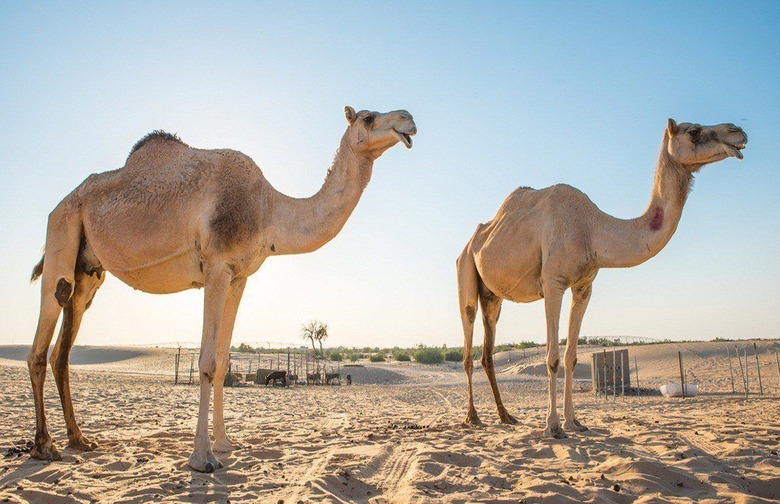Camel Milk Sounds Disgusting But It's Really Good For You
Let's all be honest with ourselves for a second here: The thought of drinking any milk that's not coming from the bosom of your mother is strange. Don't think so? Check out a cow's udders after they've been hooked up to some industrial-grade milk pumps. I'm not saying milk hasn't had its place in the human diet for centuries, but the idea that milk from one animal is any less repulsive than another should really be cast aside.
Unfortified milk is a powerful source of calcium and protein, regardless of whether it's coming from a cow, goat, sheep, or camel. Yes, I said camel.
Camel milk has historically only been consumed by nomads and herders in the arid climates of northern Africa and western Asia. Camels thrive in the desert climate because of their humps, which serve as a reservoir of fatty tissue (not water — that's a common misconception), and their ability to retain water in their blood stream. This combination allows camels to survive for days in the desert with neither food nor water.
The Maldharis, a community of nomadic camel herders from the Kutch district of northwestern India, have been drinking raw camel milk for centuries, and claim it as an all-encompassing cure for ailments ranging from acid reflux and fever to diabetes. A few studies have been able to support these claims, with one set of findings showing that camel milk helps regulate insulin secretion and sugar levels in patients with type 1 diabetes. Compared to cow's milk, camel milk is higher in fat and protein, lower in cholesterol, and has three times the vitamin C and 10 times the iron. It's also higher in unsaturated fatty acids and B vitamins.
Unfortunately, there are a few factors holding camel milk back from adorning the aisles of Whole Foods. There's the obvious 'ick' factor that comes with the thought of drinking a fluid sourced from a camel's nipple. Camel milk also has a distinct taste that has been described as anything from sweet and earthy to gamey, salty, and sour. Desert Farms is currently one of the few commercial brands in the United States marketing camel milk in both pasteurized and raw forms (the latter is subject to strict Food and Drug Administration regulatory laws prohibiting the sale of unpasteurized dairy products), and has seen some initial success, but whether customers will be able to get over the psychological hump and try a cup of camel milk is still unknown.
